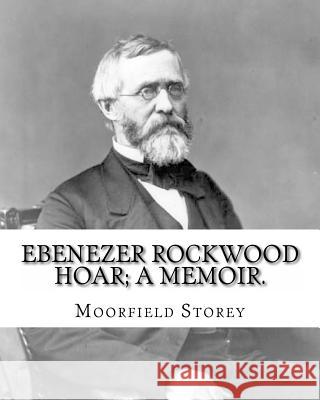Ebenezer Rockwood Hoar; a memoir. By: Moorfield Storey and By: Edward W. Emerson: Hoar, E. R. (Ebenezer Rockwood), 1816-1895, United States -- Politic » książka
Ebenezer Rockwood Hoar; a memoir. By: Moorfield Storey and By: Edward W. Emerson: Hoar, E. R. (Ebenezer Rockwood), 1816-1895, United States -- Politic
ISBN-13: 9781539678083 / Angielski / Miękka / 2016 / 134 str.
Ebenezer Rockwood Hoar; a memoir. By: Moorfield Storey and By: Edward W. Emerson: Hoar, E. R. (Ebenezer Rockwood), 1816-1895, United States -- Politic
ISBN-13: 9781539678083 / Angielski / Miękka / 2016 / 134 str.
(netto: 38,22 VAT: 5%)
Najniższa cena z 30 dni: 37,53 zł
ok. 13-18 dni roboczych.
Darmowa dostawa!
Moorfield Storey (March 19, 1845 - October 24, 1929) was an American lawyer, anti-imperial activist, and civil rights leader based in Boston, Massachusetts. According to Storey's biographer, William B. Hixson, Jr., he had a worldview that embodied "pacifism, anti-imperialism, and racial egalitarianism fully as much as it did laissez-faire and moral tone in government."Storey served as the founding president of the National Association for the Advancement of Colored People (NAACP), serving from 1909 to his death in 1929. He opposed United States expansionism beginning with the Spanish-American War. Moorfield Storey was born in 1845 in Roxbury, Massachusetts, a suburb of Boston. His family was descended from the earliest Puritan settlers in New England and had close connections with the abolitionist movement. Storey's father was a Boston lawyer. The young Storey went to the Boston Latin School and graduated in 1862, during the beginning of the Civil War. He then continued onto Harvard, where he was a member of the Glee Club, graduating in 1866, and then studied at Harvard Law School. In a speech almost thirty years later at Cambridge University, Storey discussed the mindset of the young men of his generation, stating that "a great movement for intellectual, religious, and political freedom was just culminating..." Edward Waldo Emerson (July 10, 1844 - January 27, 1930) was a United States physician, writer and lecturer.Emerson was born in Concord, Massachusetts. He was a son of Ralph Waldo Emerson and Lidian Jackson Emerson, and educated at Harvard, where he graduated in 1866. He graduated from the Harvard Medical School in 1874, and practiced medicine in Concord until 1882, when he received an inheritance and retired from his practice.He then became an instructor in art anatomy at the School of the Museum of Fine Arts 1885-1906. He was also an accomplished equestrian. Edward Waldo Emerson (July 10, 1844 - January 27, 1930) was a United States physician, writer and lecturer. Ebenezer Rockwood Hoar (February 21, 1816 - January 31, 1895) was an American politician, lawyer, and justice from Massachusetts. He was appointed U.S. Attorney General in 1869 by President Ulysses S. Grant; he became the first U.S. Attorney General to head the newly created Department of Justice in July 1870. As Attorney General Hoar worked with President Ulysses S. Grant and Secretary of State Hamilton Fish over contentious issues as settling the Alabama Claims with England and in keeping the United States from recognizing Cuban belligerency during the Ten Years' War. Hoar assisted Grant in appointing two Supreme Court justices that helped overturn a decision outlawing paper money as legal tender. Hoar himself, nominated by President Grant, was rejected by the Senate to fill a Supreme Court vacancy, in part due to senators' dismay over Hoar's resistance to distribution of federal patronage jobs without regard to the job applicant's capabilities. Hoar's position on Grant's Cabinet was tenuous, since two Cabinet members, Secretary of the Treasury, George S. Boutwell and Hoar, were from Massachusetts, during an era when regionally balanced cabinets were an expected norm by members of the U.S. Senate. In June 1870, Hoar was asked to resign by President Grant; Hoar's unexpected resignation became controversial when his resignation letter to Grant was printed by news journals. Hoar departed from office in November 1870, upon the confirmation of Amos T. Akerman from Georgia.....











